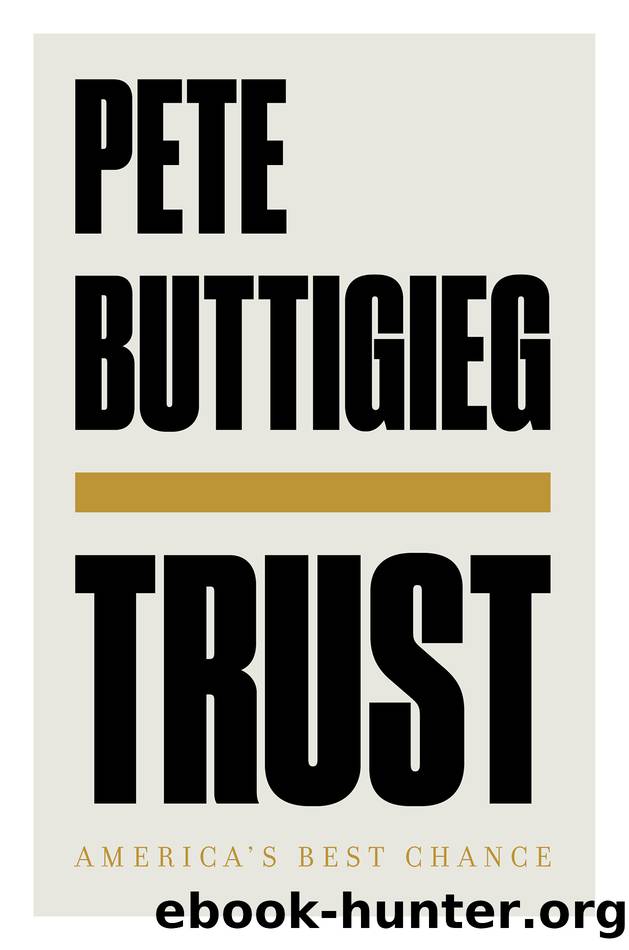Trust by Unknown

Author:Unknown
Language: eng
Format: epub
Tags: Epub3
Publisher: Liveright
MORE THAN PERHAPS any other country, America defines itself based on our constitutional system. The Bill of Rights is as essential to what it means to be American as the Japanese language, ethnicity, and imperial history are to what it means to be Japanese. Fundamentally, ours is not an ethnic identity but a civic one. This means that for us, even more than for most other people around the world, a sense of trust is not just strategically important, but existentially meaningful: if the cornerstone of American identity is democracy, the cornerstone of democracy is trust.
Many of the most important debates at our nationâs founding were about trustâhow much trust could be placed in the hands of the people, and how much the people could trust the government they were inventing and preparing to empower. In a sense, the founding itself was a statement on trust, and the Constitution an attempt to structure the foundersâ beliefs on how that trust could be distributed.
Thomas Jefferson wrote, âI have no fear that the result of our experiment will be that men may be trusted to govern themselves without a master.â21 Not everyone in that period was so sure. Sizing up the early French Revolution, the British thinker Edmund Burke commented: âThe effect of liberty to individuals is that they may do what they please; we ought to see what it will please them to do, before we risk congratulations which may be soon turned into complaints.â22
And alongside the question of how much the system of government should trust the people came the question of how much the government of the people could be trusted by the people. For John Adams, it was a central issue: âThe only Maxim of a free Government ought to be to trust no Man living with Power to endanger the public Liberty.â23
Indeed, the whole of the Federalist Papers can be read as a debate over who should be trusted with what powers. Trust and distrust were a constant theme, as the founders negotiated around the inescapable fact that trusting anyone or anything (including a government) with an important role inescapably also meant trusting it with power. As Hamilton put it in Federalist No. 23, on the question of whether the federal government should be responsible for common defense, âThe moment it is decided in the affirmative, it will follow, that that government ought to be clothed with all the powers requisite to complete execution of its trust.â And there was no way to do this without, to some extent at least, accepting what James Madison, in Federalist No. 41, called âthe possible abuses which must be incident to every power or trust, of which a beneficial use can be made.â
The product of these debates was a Constitution that embodies these tensions, both defining and limiting the level of trust placed in the federal government. The Constitution trusted the people with the power to choose their president, but added an Electoral Collegeâjust in case. It gave the people the power to choose their representatives in the House, but it handed the power to appoint U.
Download
This site does not store any files on its server. We only index and link to content provided by other sites. Please contact the content providers to delete copyright contents if any and email us, we'll remove relevant links or contents immediately.
The Fine Print (Dreamland Billionaires Book 1) by Lauren Asher(2545)
Fury of Magnus by Graham McNeill(2435)
The Last House on Needless Street by Catriona Ward(2380)
The Rose Code by Kate Quinn(2187)
A Little Life: A Novel by Hanya Yanagihara(2091)
Malibu Rising by Taylor Jenkins Reid(1902)
The God of the Woods by Liz Moore(1892)
Luster by Raven Leilani(1889)
Transcendent Kingdom by Yaa Gyasi(1843)
Moonflower Murders by Anthony Horowitz(1832)
The Lost Book of the White (The Eldest Curses) by Cassandra Clare & Wesley Chu(1678)
This Changes Everything by Unknown(1495)
The Midwife Murders by James Patterson & Richard Dilallo(1471)
The New Wilderness by Diane Cook(1434)
The Lying Life of Adults by Elena Ferrante(1424)
Wandering in Strange Lands by Morgan Jerkins(1402)
Written in the Stars by Alexandria Bellefleur(1388)
Ambition and Desire: The Dangerous Life of Josephine Bonaparte by Kate Williams(1379)
The Lying Life of Adults by Elena Ferrante;(1301)
